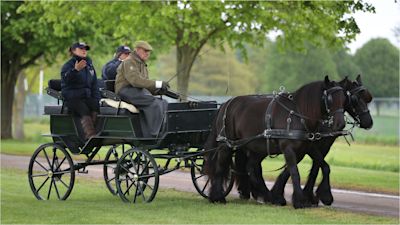Prince Philip’s love of carriage-driving to be a poignant feature at funeral

The Duke of Edinburgh's love of carriage-driving will be remembered at his funeral on Saturday with his carriage, which he designed, and ponies making an appearance.
In a poignant display of his passion for the sport, the polished dark green four-wheeled carriage, accompanied by two of Philip’s grooms, will stand in the Quadrangle of Windsor Castle as the duke’s coffin is carried past in a procession on a Land Rover hearse.
The carriage is the duke's most recent, one he began using at the age of 91 for riding around Windsor and other royal estates.
The duke’s two black Fell ponies, Balmoral Nevis and Notlaw Storm, will accompany the carriage - both born in 2008.
Balmoral Nevis was bred by the Queen, with Fell ponies being an endangered breed.
The carriage and ponies that will make a poignant appearance at Philip's funeral
Philip had been designing driving carriages since the 1970s.
The carriage featuring in Saturday's procession is made of aluminium and steel, the carriage was built to the Duke’s specifications eight years ago, drawing on his knowledge of FEI (Federation Equestre Internationale) driving.
It can seat four people at maximum capacity and can harness up to eight horses.
It has two padded black leather seats and a clock mounted on brass at the front, which features an inscription commemorating the gift of the timepiece.
The clock was presented to Philip by the Queen’s Royal Irish Hussars on October 25 1978 to mark his 25 years as their Colonel-in-Chief.
Philip, who died last week aged 99, was synonymous with carriage-driving.
He loved nothing more than to go haring through the countryside at high speed, whip in hand, in a horse-drawn wheeled carriage.
"I am getting old, my reactions are getting slower, and my memory is unreliable, but I have never lost the sheer pleasure of driving a team through the British countryside," he explained in the book he wrote about the sport.
Even when he was an octogenarian he continued to compete in demanding carriage-driving competitions.
On our Royal podcast: The Duke of Edinburgh's life, legacy and how he will be remembered
The Earl and Countess of Wessex recalled some of the scrapes Philip got into while carriage-driving around the Windsor estate when paying tribute earlier in the week.
Sophie said Philip had been “pulled out of a few ditches here I seem to remember as well”.
Laughing, Edward said: “In the early days, yes, he used to have a few problems.”
Sophie added: “More recently too.”
How did the Duke of Edinburgh become synonymous with carriage-driving?
Philip was forced to give up polo at the age of 50 in 1971 due what he called his “dodgy” arthritic wrist, and decided to find a new sport to concentrate on.
“I suppose I could have left it at that, but I have never felt comfortable as a spectator,” he admitted.
Tennis, golf and squash were no good for his wrist and sailing would have taken him away from home at weekends.
“It then suddenly occurred to me that this carriage-driving might be just the sport,” Philip said.
The Duke, as president of the International Equestrian Federation, had initiated drafting the first international rules for carriage-driving in 1968, which sparked an interest in the sport.
In 1971, he went to Budapest to watch the first European championship and then the World Championships in Germany in 1972 to see how the rules were working.
Philip began training himself, starting with five bays from the Royal Mews and a four-in-hand driver at Sandringham with help from Major Tommy Thompson, former riding master of the Household Cavalry.
He began his competitive career in 1973.
In 1980 he was a member of the victorious British team at the world carriage-driving championships held at Windsor and of the UK’s bronze medal-winning team in the European championships in Switzerland the following year.
Towards the end of the 1980s, he ceased driving four-in-hand teams but continued to drive competitively with teams of ponies.
By far his most famous convert was Lady Penny Romsey, now the Countess of Mountbatten of Burma, whom he coached.
The countess – who was one of the Duke’s closest friends – has been given the honour of being one of the 30 guests at his funeral on Saturday.
He also taught his daughter-in-law, the Countess of Wessex, and his granddaughter Lady Louise Windsor, 17, has taken up the sport.
The sport was a hazardous one and Philip had what he called his own “annus horribilis” in 1994 with “no less than eight disasters”.
“I must have got a bit too close to the rails on the way off it. The next thing I knew I was out of my seat and flying through the air to the left,” he wrote of one of the incidents in his aptly titled book 30 Years On And Off The Box Seat.
He eventually retired from the sport in 2003 in his early 80s when many his age had ceased to be involved with competitive sports decades ago.
But he still took part non-competitively in his 90s and continued to drive his team of Fell ponies around the royal estates as well as judging and keeping time at carriage-driving competitions.
Watch Prince Philip - A Royal Funeral from 1.15pm on Saturday 17 April on ITV and itv.com/news.